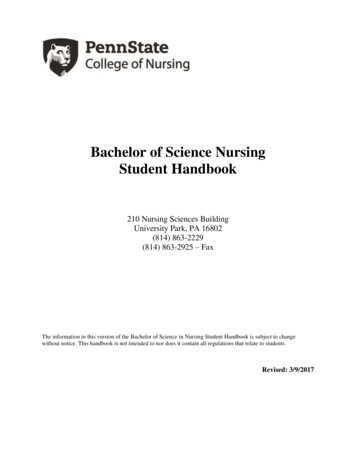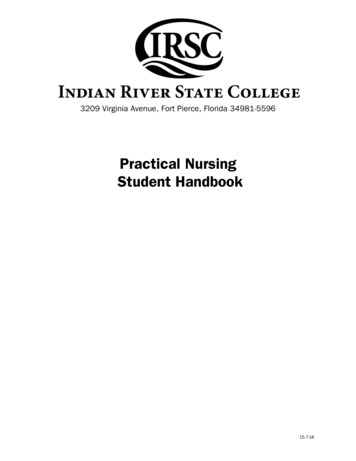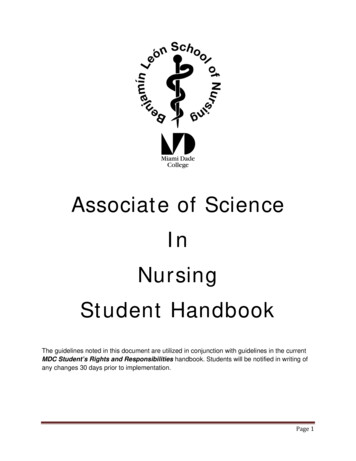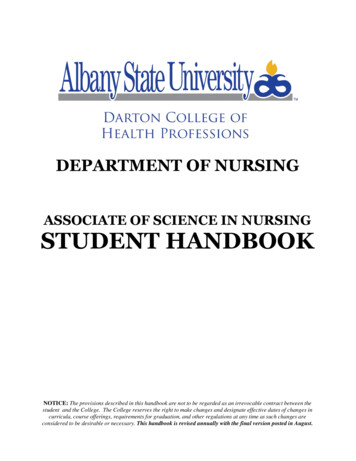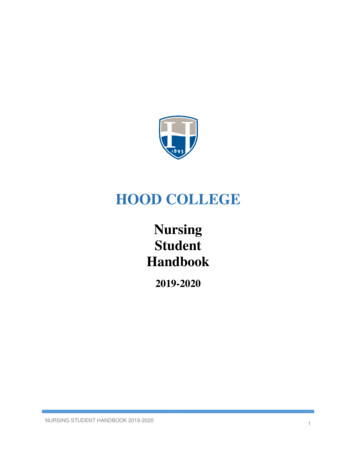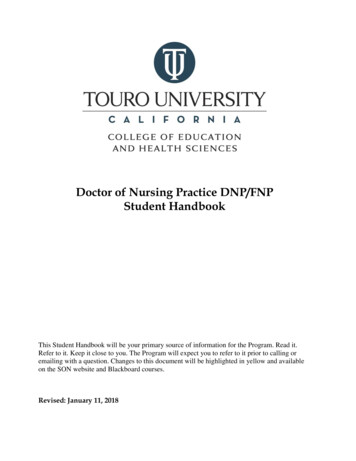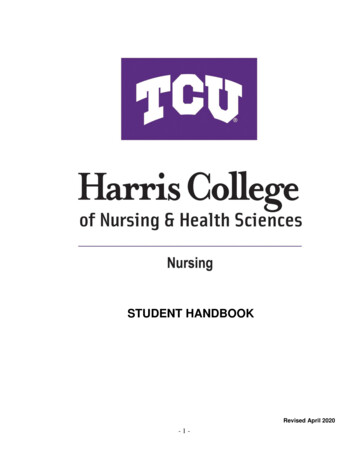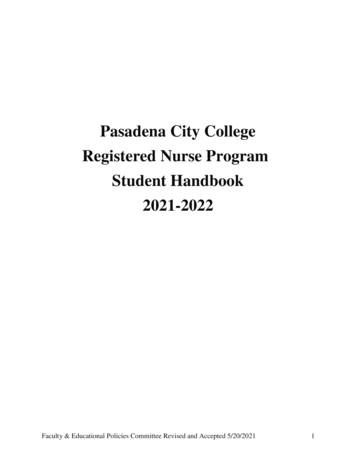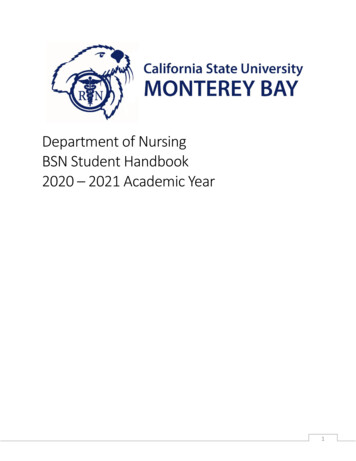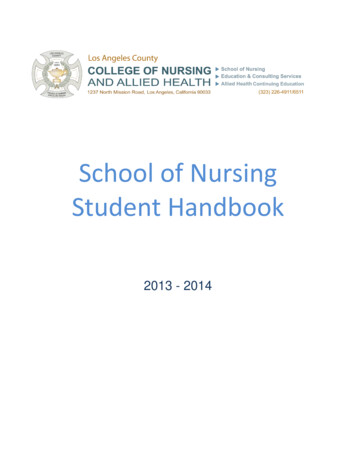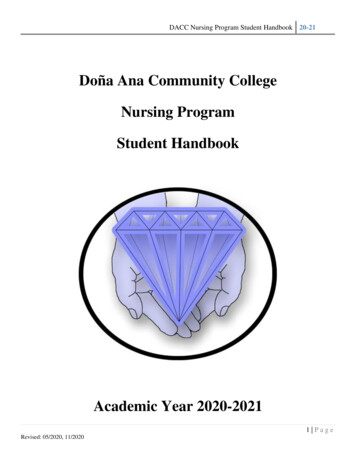
Transcription
TENNESSEE WESLEYAN UNIVERSITYFORT SANDERS NURSING DEPARTMENTNURSING STUDENT HANDBOOKESTABLISHED 1999Revised 2019
The Tennessee Wesleyan University Fort Sanders Nursing Department (TWU-FSN) Nursing Student Handbook issupplemental to the Tennessee Wesleyan University Catalog and Student Handbook. The Nursing StudentHandbook contains policies and procedures to assist the student in the development of professional practice andto establish a learning community conducive to quality educational outcomes and a successful learning experience.1
Table of ContentsI.Fort Sanders Nursing Department (TWU-FSN)Nursing Department Mission Statement . 4Nursing Department Philosophy . 4Nursing Department Student Learning Outcomes . 5Professional Standards . 5II.Student ConductCode of Ethics . 6Class/Clinical Conduct . 6Drug Screens and Substance Abuse . 6Criminal Background Checks and Criminal Behavior . 6Smoking and Other Tobacco Products . 6Social Media Policy . 6Nursing Academic Honesty . 7Plagiarism . 7Attendance . 8Class, Clinical, Lab Attendance . 8Tardiness Policy . 9Illness . 9Inclement Weather . 9III.Student ServicesCommunication . 10Cell Phones . 10Textbooks and Clinical Fees . 10Library . 10Health Care . 10Policy for changes in physical/mental health . 11Health Insurance . 11Students with Disabilities . 11Counseling Services . 11Alert System . 12Emergency Event . 12Student Contact Information . 12IV.FacilitiesWest Knoxville. 12Fort Sanders Regional Medical Center . 12Athens . 12Safety/Security . 13Cafeteria and Food Services. 13Transportation and Parking . 13V.AcademicsPrivacy/FERPA . 13Advising. 13Taping of Lectures . 14Tutoring . 14Grading Policy . 14Grading Scale . 14Exam Policy . 142
Examsoft . 15ATI. 15Academic/Clinical Warning . 15Immediate Dismissal from the Nursing Program . 16Add/Drop Procedure . 16Withdrawal from Nursing Major . 16Readmission/Progression in the Nursing Program . 16Repeating Nursing Course . 16Taking Course at another Institution . 17VI.Clinical RequirementsClinical Authorization. 17Nursing Equipment. 17Cell Phone and Computer Use . 18Clinical Evaluation/Progression Tool. 18Clinical Warning . 18Safe Use of Nursing Laboratory & Training Equipment . 18Liability Insurance . 18VII.Dress Code / Appearance PolicyUniforms . 19Guidelines for Clinical and Professional Meetings . 20VIII.Convocations and Professional MeetingsConvocation Programs. 22Nurses Christian Fellowship . 22Sigma Theta Tau, Rho Mu Chapter . 22National, State, & School Student Nurses Associations . 22IX.Nursing Scholarships & AwardsFort Sanders Regional Medical Center Volunteer Services Scholarship . 23The Ruth Crawley RN Scholarship Award . 23Nursing Academic & Clinical Excellence Awards . 23X.The Last SemesterGraduation . 24Exit Interviews . 24Final Transcripts. 24Return of Badges and Security Card . 24NCLEX-RN . 24XI.AppendicesA. American Nurses Association “Code for Nurses” . 28B. National Student Nurses Association Code of Academic and Clinical Conduct . 29C. ATI Policy . 30D. Progression Tool for Clinical Evaluation . 35E. TWU-FSN Student Nurse Association BY-LAWS . 42Attestation & Waivers [Sample Documents]Attestation for Nursing Student Handbook . 52Waiver of Liability for Nursing Lab & Training Equipment . 533
TENNESSEE WESLEYAN UNIVERSITYFORT SANDERS NURSING DEPARTMENTThe Tennessee Wesleyan University Fort Sanders Nursing Department (TWU-FSN) evolved in 1999 from a jointeffort of two highly respected educational institutions in East Tennessee. The rich heritage in nursing education atFort Sanders School of Nursing in Knoxville merged with the long tradition of Tennessee Wesleyan University ofproviding quality education to the community. This initiative created a baccalaureate degree nursing program forbasic and registered nurse (RN) students.Nursing Department Mission StatementThe mission of Tennessee Wesleyan University Fort Sanders Nursing is to prepare professional nurses for lives ofsignificance, leadership and service through quality nursing education within the Christian tradition.Nursing Department PhilosophyThe faculty of the Tennessee Wesleyan University Fort Sanders Nursing Department believe people are unique,biological, emotional, social and spiritual beings with dignity, worth, and inherent rights of freedom and choice. Eachperson develops values and beliefs which are influenced by the social institutional forces of family, education,government, community and religion. People develop and change throughout the lifespan by interacting with theinternal and external components of the environment which impact both human functioning and the state of health.We believe health is a dynamic, multidimensional state of being, based on a wellness/illness continuum. Peoplestrive to attain, maintain, and promote a positive state of health by enhancing adaptation to environmental variables.We believe healthcare is a basic human right while the quality of health is an individual responsibility influenced bypersonal behaviors.We believe nursing is a profession and an academic discipline based on a scientific body of knowledge requiringcritical thinking, problem-solving, ethical reasoning, accountability, scholarship and a commitment to lifelong learning.The primary goals of nursing are to maintain, restore and promote optimum health, and to provide end-of-life carewith diverse populations in a variety of settings. Safe quality patient care is implemented through the roles of thenurse as a provider of care, manager of care and active member in the profession of nursing.We believe education is a dynamic, on-going process of growth and development that involves acquisition andapplication of knowledge and skills culminating in new patterns of behavior. The men and women who demonstratean interest and commitment to nursing are unique individuals with diverse backgrounds and learning styles.Education must take place in a non-threatening, open environment that fosters creativity, self-motivation, the spirit ofscientific inquiry and effective communication. The responsibility for learning is shared by both student and faculty;thus, the curriculum is planned, implemented, and evaluated by the faculty with input from students and graduates toassist in meeting educational goals.4
Nursing Department Program Learning Outcomes:As a professional nurse embodying the roles of provider of care, manager of care, and member of the profession, thegraduate will:1) Coordinate the delivery of health and nursing care through the application of knowledge from the nursing discipline,humanities, and natural and behavioral sciences.2) Synthesize a plan of care using a systematic problem solving process for the provision and management of carein a variety of settings for individuals, families, and communities from diverse cultures across the lifespan.3) Utilize knowledge of the research process and research findings to enhance evidence-based nursing practice.4) Collaborate effectively with individuals, groups, and members of the health team using various informatics topromote achievement of healthcare goals.5) Demonstrate leadership in the provision and management of healthcare and in the advancement of professionalnursing.6) Integrate ethical and legal principles into nursing practice.7) Participate in the social, political, and professional arena that influences the health and welfare of culturally diversecommunities of interest.8) Assume responsibility for personal and professional growth and development through lifelong learning.9) Minimize risk of harm to patients and providers through both system effectiveness and individual performance inthe clinical experience.10) Incorporate spirituality and a servant-leader perspective into culturally diverse nursing care during the clinicalexperience.Revised: Dec. 2018Professional StandardsThe Nursing Department’s philosophy and objectives embody an identified set of professional nursing standards.The selected standards include:(1) The Essentials of Baccalaureate Education for Professional Nursing (American Association of Colleges of Nursing,2008).(2) Standards of Clinical Nursing Practice (American Nurses Association, 2010).(3) Tennessee Nurse Practice Act (2010).(4) Quality and Safety Education in Nursing (Case Western University, 2014, http://qsen.org/competencies/prelicensure-ksas/)5
STUDENT CONDUCTCode of EthicsConsistent with the philosophy of TWU-FSN, faculty and students demonstrate exemplary ethical and professionalstandards and values. The TWU-FSN Code of Ethics subscribes to standards established in the American NursesAssociation (ANA) Code for Nurses (2015) (see Appendix A), the National Student Nurses Association (NSNA) Codeof Academic and Clinical Conduct (2009) (see Appendix B), and the University Standards of Conduct as stated in theTWU Student Handbook. These standards form the basis for acceptable behavior. Students and faculty arerepresentatives of the Nursing Department, Tennessee Wesleyan University, and the nursing profession. Thisresponsibility includes class and clinical experiences and also becomes a part of one’s values, behavior, andexpression of self.Class and Clinical ConductStudents are expected to be professiona
The Tennessee Wesleyan University Fort Sanders Nursing Department (TWU-FSN) Nursing Student Handbook is . thus, the curriculum is planned, implemented, and evaluated by the faculty with input from student

